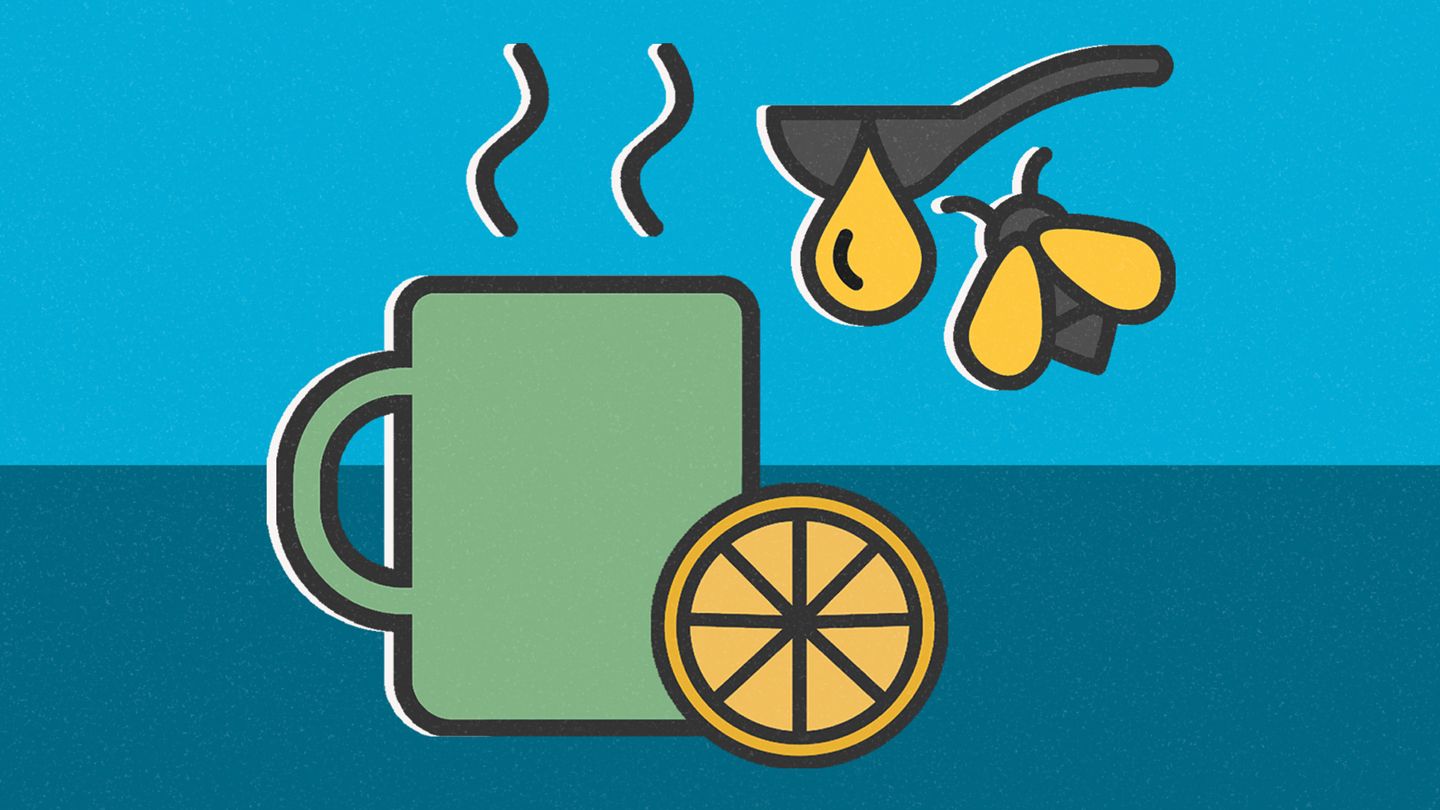Harnessing the Power of Honey and Onion for Cough Relief
When an irritating cough strikes, reaching for over-the-counter medication may seem like the quickest route to silencing symptoms. However, the remedy you likely have ready in your kitchen can prove just as effective without side effects: honey and onion.
The Science Behind Honey and Onion Cough Remedies
Both raw honey and onions contain active compounds that make them prized natural cough suppressants. Onions generate sulfur-containing gases when chopped or chewed that act as expectorants, thinning mucus and stimulating coughs to push germs out faster. Honey has antioxidant, antimicrobial elements alongside coating properties that soothingly coat airways.
Blending antibacterial, mucus-dissolving onion with viscous, wound-healing honey creates a powerhouse remedy for calming coughs naturally. Unlike commercial cough syrup’s risks, correctly preparing and ingesting this dynamic duo has no known side effects.
Signs You Have an Onion and Honey-Treatable Cough
Honey and onion mixes work well for many mild to moderate cough types, but excel when certain symptoms manifest signaling upper respiratory viral or bacterial infections.
Watch for cues like: dry, non-productive coughs with irritated throat; congested chest coughs yielding thick mucus; or sudden, uncontrolled cough spells disrupting sleep. Any infection-related cough lasting over 1 week without improving also warrants onion-honey relief exploration before antibiotics.
Preparing Onion and Honey Mixtures for Cough Relief
Blending onion and honey is easy using recipes uniformly relying on just these two main ingredients prepared as tonic-like syrups. Follow these steps for various standard preparations:
Onion Juice and Honey Cough Syrup
Ingredients:
- 1 large yellow or white onion
- 1 cup honey
Directions:
- Chop onion finely then put in a juicer to extract 1⁄2 cup liquid onion juice
- Pour juice into small saucepan with honey, stir combining over very low heat 2-3 minutes till blended
- Remove from heat, cool, then transfer to lidded glass jar storing in refrigerator
- Take 1-2 tsp doses as needed for cough relief up to 4 times daily
Caramelized Onion and Honey Cough Drops
Ingredients:- 1 medium yellow onion, diced
- 1 cup honey
- 1 tsp coconut oil
- Sauté chopped onion with oil in saucepan over medium heat until lightly caramelized, about 15 minutes
- Reduce heat to lowest setting then stir in honey till incorporated with onions
- Drop teaspoon amounts on parchment paper lined baking sheet
- Cool in refrigerator until hardened then peel cough drops from paper
- Slowly dissolve 1-2 cough drops in mouth as needed to ease coughing
Onion, Garlic, Honey Homemade "Chest Rub"
This version with added garlic harnesses antiviral, antibacterial properties for congestion relief when rubbed on chest.
Ingredients:- 1 onion, finely chopped
- 4 garlic cloves, minced
- 1 cup honey
- 1 cup coconut or olive oil
- Gently sauté onion and garlic with oil in saucepan until softened and fragrant
- Turn off heat, mix in honey till smooth chest rub consistency forms
- Store salve in lidded glass jars, rub tablespoon amounts directly on upper chest beneath throat as needed to ease chest congestion and cough.
Other Supportive Steps When Sick With a Cough
While raw honey and onion mixtures help calm cough symptoms topically or by ingestion, be sure to support your body’s healing process during illness holistically by also:
Resting to Conserve Energy
Don’t push through fatigue or punish yourself with busy work agendas when ailing. Prioritize extra sleep, lying down between tasks, and giving yourself permission to simply rest and recover.
Staying Ultra Hydrated
Combat dehydration from fever, runny noses or coughs drying out throat tissue by sipping purified water, coconut water, ginger tea and broths consistently throughout the day.
Trying Steam Showers
Inhaling warm mist moistens and relaxes air passage linings disrupted by coughs. Let hot shower spray billow steam to breathe deeply, do facial steams, or setup a humidifier in rooms you occupy most.
Taking Supplements
Zinc, vitamin C, echinacea drops and elderberry syrups can all strengthen immunity, ease stuffiness and speed upper respiratory recovery timelines by days.
Adjusting Diet
Remove mucus-producing dairy, eat clean, vitamin-rich foods like fruits and veggies, incorporate anti-inflammatory spices like turmeric and ginger, and boil homemade broths loaded with garlic and onions for added internal relief.
When to Seek Medical Care for Coughs
While raw honey and onion remedies help ease many mild coughs naturally, certain red flag symptoms warrant seeing a doctor promptly for evaluation including:
- Cough persists longer than 2 weeks without improvement
- Cough produces yellow, green or bloody mucus
- Severe, uncontrollable coughing fits leave you gasping for air
- Trouble breathing, chest pain or wheezing accompanies cough
- Very high fever, non-stop sweats or unexplained weight loss along with cough
Don’t hesitate reaching out to your healthcare provider if coughs worsen or appear infection-related for proper testing, treatment and to rule out dangerous problems like pneumonia.
Identifying Cough Triggers
Take notes in a symptom journal tracking any patterns around when cough flares up such as:
- At night disrupting sleep
- When exposed to irritants like smoke, pet dander, molds or strong scents
- During or after meals
- With seasonal allergies or asthma attacks
- When acid reflux occurs
- Upon moving to a new climate or geographic location
- After taking specific medications
Pinpointing variables that consistently precede bad cough phases informs individualized strategies, environment/diet modifications and targeted treatments for resolving root triggers.
Seeing an Allergist
If cough manifests alongside classic allergy symptoms like sneezing, stuffy nose, watery eyes or itchy skin/throat upon exposure to particular environments or foods, specialized allergy testing can identify specific irritants prompting reactions so appropriate avoidance or medication therapies get administered.
Evaluating Medications
Certain prescription drugs like ACE inhibitors for managing high blood pressure are notorious cough instigators. Review all medications with both pharmacist and doctor to rule out any current pills provoking cough flares as a side effect.
Empower yourself in conquering coughs by tapping into honey and onion’s soothing properties at home while also seeking symptom source clues from specialists so lasting relief follows.
FAQs
What's the ratio of honey to onion I should use?
Most recipes call for approximately 1 cup of honey blended with 1 medium raw onion's juice or chopped onion. Adjust amounts based on your tastes and cough severity.
Can I give honey and onion cough remedies to my kids?
Yes, honey and onion mixes can be given to children over 1 year old but adjust doses based on age and weight. Check with your pediatrician to be sure before administering any cough remedy.
How long does the honey and onion cough syrup last?
Most homemade honey and onion syrups stay usable for 1-2 months when tightly sealed and stored in the refrigerator. Discard batches if you see any mold or changes in appearance, texture or aroma develop.
What kind of honey should I use?
Raw, unfiltered honey packs the most health properties. Locally harvested varieties like wildflower, clover or evergreen honey offer unique local plant benefits too. For children under 1 year old, pasteurized commercial honey is safest.
Disclaimer: This article is for informational purposes only and does not constitute medical advice. Always consult with a healthcare professional before starting any new treatment regimen.
Related Coverage
Chigger season in Texas typically starts in spring and lasts through late summer, with peak activity in May, June and July. Learn how to identify bites and prevent misery....
Learn about Coricidin HBP, its ingredients, and how it can cause drowsiness. Discover user experiences and important safety considerations to make informed decisions about this medication....
When intermittent fasting, a common question is if swallowing mucus or phlegm affects fasted states metabolically. Learn what experts say about mucus content and fasting efficacy....
You likely have the ingredients for highly effective home remedies already stocked in your kitchen. Learn how everyday items like honey, lemons and apple cider vinegar can treat coughs, improves digestion, soothe skin, and more!...
Ginger cuts candy strikes the perfect balance of ginger heat and sugar sweetness for a uniquely warming, aromatic taste loved by many today as nostalgic childhood candies....
Onion and honey together make a powerful natural remedy for colds. Learn how to use onion and honey to get relief from cough, congestion, sore throat and more....
From postnasal drip to laryngopharyngeal reflux, discover what's causing your throat to feel tickly and scratchy. Try home remedies, OTC meds, and professional treatments to find relief....
Learn about using onions on feet as a home remedy. This folk remedy may help reduce inflammation, improve circulation, and provide natural relief for tired, aching feet....
Intake nose strips open nasal passages to relieve sinus congestion fast. Learn how the strips work, proper usage, complementary remedies, and who should avoid them....
Learn about potential side effects and risks of mixing Nyquil cold medicine with the antibiotic amoxicillin. Discover safer alternative cough remedies to use while on antibiotics....








